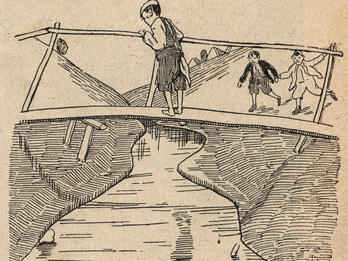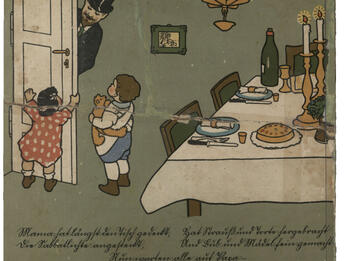On the Way
The Thoughts of a Village Boy
They are taking me to the town to go to school—let them take me. I will show them how I will learn there; and they ought to know this already, haven’t they seen and also heard from me thousands of times, that I don’t want to learn and I will not learn. And so what if they are taking me? Let them take me! I really love to travel. I have often hung off the back of one of the wagons and traveled quite a while, until one of the passersby saw me and told the wagon driver. To be sure, they seated me deep inside the carriage, and I couldn’t see everything the way I would have liked to. But it is very good for me here. Here, inside the carriage, there’s a small window, and I look through it and I see all the places we’re passing. And when they seated me here, I stood on my knees and looked through the window: my mother stood beside the carriage, and while wiping tears from her eyes, she spoke to my companion, asking him to watch over me on the journey and guard me well. I don’t understand at all: my mother is crying that I am leaving her, and she is nevertheless sending me on my way, saying, “You have to learn; study well and you will become a man.” I was very angry that they wanted to force me to learn, but my mother’s tears made me sad, and I was heartsick. I truly do not understand her words, “and you will become a man.” It is obvious that when I grow up I will become a man, even if I don’t learn. And how am I supposed to learn? No way am I able to sit in one place hour after hour and answer after the teacher. No, I will not be able to do this—period!
They solemnly told me that the teacher knows everything; so once I asked him: “How does the rain fall?” He answered, “It is good that you should look in the book and know what is written in it.” Another time I asked him: “Why is it that in the spring the grass grows green, and the lovely flowers and field plants bloom, and in the winter they all disappear?” And he answered that it was better for me to listen to his words than to pay to attention to such worthless things. Are all the flowers worthless? The grass is certainly not worthless, for without the grass, there wouldn’t be any cattle. And when I once asked him, “Why do so many birds leave our land and fly far away at the start of the winter? Why do only the small birds and crows stay here with us?”—the teacher got angry and almost hit me with his thick cane, but I ran out of the heder quickly.
Afterwards they forced me to return and go back to the heder. My mother scolded me and threatened to shut me in the dark barn the whole night. [ . . . ]
I don’t want to learn, and I can’t. I don’t like the teacher and his lessons. But one time I listened to his words. This was after the rain. I looked out the window and heard the chirping of the happy birds as they skipped from branch to branch. The air was fresh, the trees were green, and I could see the blue sky between their branches, and there was a rainbow in the clouds before me. I poked my classmate, so that he could also notice the beautiful rainbow, but my eyes met those of the teacher and I was silent, and I perked my ears to listen; and behold, he was reading with my friend the story of the Flood, of the rainbow that God set in the cloud as a sign of the covenant, that God would never again bring a flood on the land to destroy all flesh, and therefore the rainbow appears after the rain as a reminder of this covenant. I heard his words and thought to myself, it is sometimes pleasant to hear the lesson, but why would the teacher not answer the question that I had asked, even though today he himself told the very thing that I wanted to ask about? I wanted to hear more, but boredom quickly overcame me, because he went over the same things two and three times with my friend. I then took the penknife that my mother had given me out of my pocket, and under the desk I started to make little sticks. Some were already done, and I wanted to make many more sticks like these, because I wanted to make myself a little wagon, like the wagon of our neighbor Stephan the peasant, the cart in which he would bring the crops from the field. The teacher saw what I was doing and he struck me with his strap, but I knew how to escape from his hand. How angry he was! I well understood that he hated to chastise me for no purpose; he had practically given up on me, paying me no further attention. But he complained to my mother about me [ . . . ] [so] she got up and approached me, put her hand on my head, and looked straight into my face. How I wanted to run away then! “Moishe, my son, you know how hard it is for me, a lonely widow, to bear the full burden of this house, and you are no longer a little boy, so why do you make my life bitter? The teacher has complained about you again.” How bitter were her words to me! She continued to talk, and while she talked she took my chin in her hand and looked straight into my eyes, and my tears started to flow. “You are not a bad boy, so why do you not want to learn?” How could I reply to these words? And still I could not learn. “Listen to me, promise me that you will study well. You know that an ignoramus is a dumb ox; look, you will grow up and know nothing, and you will be like one of the peasants. Is that what you want? Promise me, my son!” I am standing in silence. My eyes are full of tears, and I want to cry. “Yes, this is a punishment from God. Is it not enough that He has punished me thus, that He must continue to torture me with boys who do not want to learn? Has He not taken my husband from me; we make a meager, poor living, so we must be content with a crust of bread, and for this, too, we must give thanks to God. Look at Shmuel, he writes to me that he has already been promoted to the advanced class, but you will be an ignoramus and a boor.” [ . . . ] She continued: “Avrom didn’t want to learn, but now he is a shop assistant; don’t you want to be like him? Pay attention, my dear, to your studies. Darling, can’t you do this much? Don’t you love me?” And I—I was ready to do anything for my mother’s sake, but I still couldn’t learn.
Credits
Published in: The Posen Library of Jewish Culture and Civilization, vol. 7.




